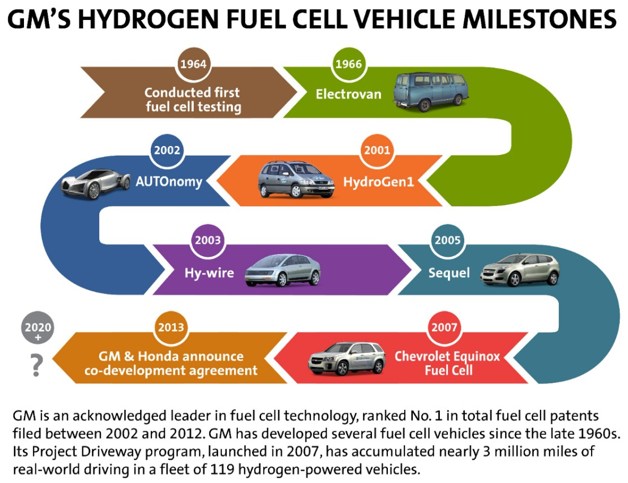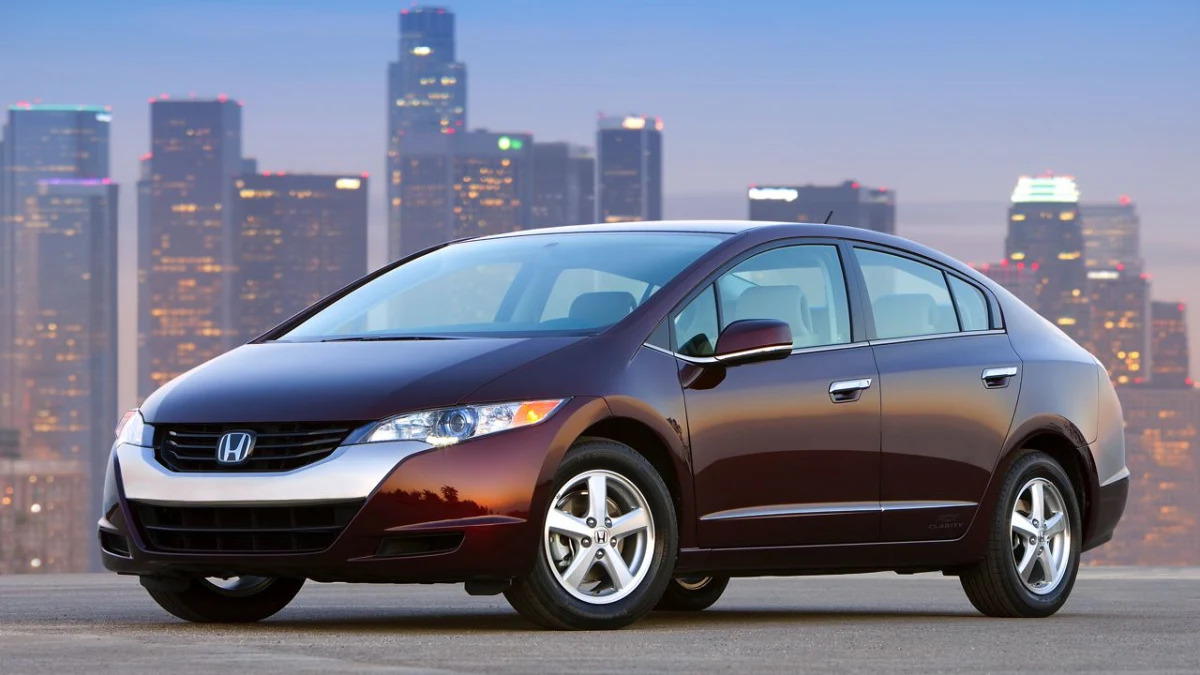In January, Ford, Daimler and Nissan announced they would all work together on fuel cell technology. Toyota is getting ready for its own 2015 fuel cell car. Hyundai is delivering H2 vehicles today. The Department of Energy has a plan called H2USA. Put all this together, and the future of the hydrogen vehicle is finally getting a little clearer. Especially with today's announcement that General Motors and Honda have signed a "long-term, definitive master agreement" that will co-develop next-generation fuel cell system and hydrogen storage technologies. The companies hope to have these new technologies in vehicles in around 2020.
To be clear, this is not an announcement that the two OEMs will build a car together, just the hydrogen guts. The main reason for the collaboration – which follows the logic Nissan CEO Carlos Ghosn laid out a few months ago – is that fuel cell starts with cost disadvantages compared to gas vehicles (e.g. the cost of the pressurized tank is higher than a plastic gas tank and there are expensive precious metals in the fuel cell stack) and it will be easier to reduce these costs in partnership. On top of this, GM and Honda want to reduce costs in whatever shared components will be in the resulting vehicles.
GM, which has its own long history with hydrogen (as you can see in the infographic below) said it has "a lot of respect" for what Honda has done with H2 technologies and the companies' technologies "complement each other," said GM vice chairman Steven Girsky. GM has put almost three million miles onto its fuel cell test fleet over the years, including with Project Driveway.
The two companies will also be contributing to hydrogen infrastructure efforts, starting in the Golden State. There are about 10 H2 stations currently open in California, with plans to increase that to 25 or so in the next few years and then 100 stations beyond that. Both Honda and GM – and other automakers – are supporting this infrastructure growth and the beginnings of a hydrogen infrastructure are also in the works for Japan and Europe. The joint press release with more details is available below.

To be clear, this is not an announcement that the two OEMs will build a car together, just the hydrogen guts. The main reason for the collaboration – which follows the logic Nissan CEO Carlos Ghosn laid out a few months ago – is that fuel cell starts with cost disadvantages compared to gas vehicles (e.g. the cost of the pressurized tank is higher than a plastic gas tank and there are expensive precious metals in the fuel cell stack) and it will be easier to reduce these costs in partnership. On top of this, GM and Honda want to reduce costs in whatever shared components will be in the resulting vehicles.
Since there was no actual car (or cars) announced, both companies declined questions on price targets for the resulting 2020 fuel cell model. Honda executive vice president Tetsuo Iwamura did say Honda hopes to make the vehicle "as affordable as possible." Currently, Honda leases the FCX Clarity (pictured) in California for $600 a month.Honda hopes to make the hydrogen vehicle "as affordable as possible."
GM, which has its own long history with hydrogen (as you can see in the infographic below) said it has "a lot of respect" for what Honda has done with H2 technologies and the companies' technologies "complement each other," said GM vice chairman Steven Girsky. GM has put almost three million miles onto its fuel cell test fleet over the years, including with Project Driveway.
The two companies will also be contributing to hydrogen infrastructure efforts, starting in the Golden State. There are about 10 H2 stations currently open in California, with plans to increase that to 25 or so in the next few years and then 100 stations beyond that. Both Honda and GM – and other automakers – are supporting this infrastructure growth and the beginnings of a hydrogen infrastructure are also in the works for Japan and Europe. The joint press release with more details is available below.

GM, Honda to Collaborate on Next-Generation Fuel Cell Technologies
Goal is commercially feasible fuel cell and hydrogen storage in 2020 time frame
2013-07-02
NEW YORK – General Motors (NYSE: GM) and Honda (NYSE: HMC) announced today a long-term, definitive master agreement to co-develop next-generation fuel cell system and hydrogen storage technologies, aiming for the 2020 time frame. The collaboration expects to succeed by sharing expertise, economies of scale and common sourcing strategies.
GM and Honda plan to work together with stakeholders to further advance refueling infrastructure, which is critical for the long-term viability and consumer acceptance of fuel cell vehicles.
GM and Honda are acknowledged leaders in fuel cell technology. According to the Clean Energy Patent Growth Index, GM and Honda rank No. 1 and No. 2, respectively, in total fuel cell patents filed between 2002 and 2012, with more than 1,200 between them.
"This collaboration builds upon Honda and GM's strengths as leaders in hydrogen fuel cell technology," said Dan Akerson, GM chairman and CEO. "We are convinced this is the best way to develop this important technology, which has the potential to help reduce the dependence on petroleum and establish sustainable mobility."
Takanobu Ito, president & CEO of Honda Motor Co. Ltd. said: "Among all zero CO2 emission technologies, fuel cell electric vehicles have a definitive advantage with range and refueling time that is as good as conventional gasoline cars. Honda and GM are eager to accelerate the market penetration of this ultimate clean mobility technology, and I am excited to form this collaboration to fuse our leading fuel cell technologies and create an advanced system that will be both more capable and more affordable."
GM's Project Driveway program, launched in 2007, has accumulated nearly 3 million miles of real-world driving in a fleet of 119 hydrogen-powered vehicles, more than any other automaker.
Honda began leasing of the Honda FCX in 2002 and has deployed 85 units in the U.S. and Japan, including its successor, the FCX Clarity, which was named the 2009 World Green Car. Honda has delivered these vehicles to the hands of customers in the U.S. and collected valuable data concerning real-world use of fuel cell electric vehicles.
As already announced, Honda plans to launch the successor of FCX Clarity in Japan and the United States in 2015, and then in Europe. GM will announce its fuel cell production plans at a later date.
Fuel cell technology addresses many of the major challenges facing automobiles today – petroleum dependency, emissions, efficiency, range and refueling times. Fuel cell vehicles can operate on renewable hydrogen made from sources like wind and biomass. The only emission from fuel cell vehicles is water vapor.
Additionally, fuel cell vehicles can have up to 400 miles driving range, can be refueled in as little as three minutes, and the propulsion technology can be used on small, medium, and large vehicles.
About General Motors Co.
General Motors Co. (NYSE:GM, TSX: GMM) and its partners produce vehicles in 30 countries, and the company has leadership positions in the world's largest and fastest-growing automotive markets. GM, its subsidiaries and joint venture entities sell vehicles under the Chevrolet, Cadillac, Baojun, Buick, GMC, Holden, Isuzu, Jiefang, Opel, Vauxhall and Wuling brands. More information on the company and its subsidiaries, including OnStar, a global leader in vehicle safety, security and information services, can be found at http://www.gm.com.
# # #
About Honda Motor Co.
Honda Motor Co. (NYSE: HMC) Honda designs, manufactures and markets automobiles, motorcycles and power products worldwide. A global leader in powertrain and electromotive technologies, Honda produces more than 25 million engines annually for its three product lines. Honda and its partners build products in more than 60 manufacturing plants in 27 countries, employing more than 179,000 associates globally.
Goal is commercially feasible fuel cell and hydrogen storage in 2020 time frame
2013-07-02
NEW YORK – General Motors (NYSE: GM) and Honda (NYSE: HMC) announced today a long-term, definitive master agreement to co-develop next-generation fuel cell system and hydrogen storage technologies, aiming for the 2020 time frame. The collaboration expects to succeed by sharing expertise, economies of scale and common sourcing strategies.
GM and Honda plan to work together with stakeholders to further advance refueling infrastructure, which is critical for the long-term viability and consumer acceptance of fuel cell vehicles.
GM and Honda are acknowledged leaders in fuel cell technology. According to the Clean Energy Patent Growth Index, GM and Honda rank No. 1 and No. 2, respectively, in total fuel cell patents filed between 2002 and 2012, with more than 1,200 between them.
"This collaboration builds upon Honda and GM's strengths as leaders in hydrogen fuel cell technology," said Dan Akerson, GM chairman and CEO. "We are convinced this is the best way to develop this important technology, which has the potential to help reduce the dependence on petroleum and establish sustainable mobility."
Takanobu Ito, president & CEO of Honda Motor Co. Ltd. said: "Among all zero CO2 emission technologies, fuel cell electric vehicles have a definitive advantage with range and refueling time that is as good as conventional gasoline cars. Honda and GM are eager to accelerate the market penetration of this ultimate clean mobility technology, and I am excited to form this collaboration to fuse our leading fuel cell technologies and create an advanced system that will be both more capable and more affordable."
GM's Project Driveway program, launched in 2007, has accumulated nearly 3 million miles of real-world driving in a fleet of 119 hydrogen-powered vehicles, more than any other automaker.
Honda began leasing of the Honda FCX in 2002 and has deployed 85 units in the U.S. and Japan, including its successor, the FCX Clarity, which was named the 2009 World Green Car. Honda has delivered these vehicles to the hands of customers in the U.S. and collected valuable data concerning real-world use of fuel cell electric vehicles.
As already announced, Honda plans to launch the successor of FCX Clarity in Japan and the United States in 2015, and then in Europe. GM will announce its fuel cell production plans at a later date.
Fuel cell technology addresses many of the major challenges facing automobiles today – petroleum dependency, emissions, efficiency, range and refueling times. Fuel cell vehicles can operate on renewable hydrogen made from sources like wind and biomass. The only emission from fuel cell vehicles is water vapor.
Additionally, fuel cell vehicles can have up to 400 miles driving range, can be refueled in as little as three minutes, and the propulsion technology can be used on small, medium, and large vehicles.
About General Motors Co.
General Motors Co. (NYSE:GM, TSX: GMM) and its partners produce vehicles in 30 countries, and the company has leadership positions in the world's largest and fastest-growing automotive markets. GM, its subsidiaries and joint venture entities sell vehicles under the Chevrolet, Cadillac, Baojun, Buick, GMC, Holden, Isuzu, Jiefang, Opel, Vauxhall and Wuling brands. More information on the company and its subsidiaries, including OnStar, a global leader in vehicle safety, security and information services, can be found at http://www.gm.com.
# # #
About Honda Motor Co.
Honda Motor Co. (NYSE: HMC) Honda designs, manufactures and markets automobiles, motorcycles and power products worldwide. A global leader in powertrain and electromotive technologies, Honda produces more than 25 million engines annually for its three product lines. Honda and its partners build products in more than 60 manufacturing plants in 27 countries, employing more than 179,000 associates globally.










Sign in to post
Please sign in to leave a comment.
Continue